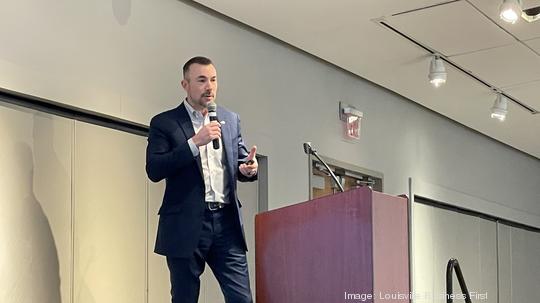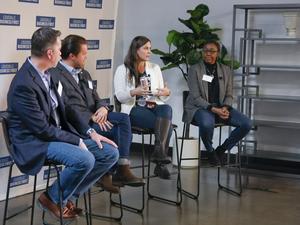
When the Soviet Union launched Sputnik 1 into space in 1957, much of the U.S. was worried about the perceived technological gap between our nation and the U.S.S.R.
That single, triggering event made the U.S. invest heavily in everything from defense to education, ultimately creating NASA less than a year later.
Decades of transformative technological advancement later, the country is now staring down another "Sputnik Moment," says Ian McClure, associate vice president for research, innovation and economic impact at the University of Kentucky, and leader of UK Innovate. And Kentucky is poised to benefit from it.
"The Sputnik moment of today has been happening for about two decades," McClure said during the Venture Connectors luncheon on Wednesday. "It has sped up in momentum over the past five years — I'm talking about the innovation competitiveness of our country, globally."

So what's happened in the past five years?
In 2019, China eclipsed the U.S. to lead in international patent filings, and in 2020, China’s IP office reported 1.5 million patent applications — 2.5 times more than the amount received by the U.S. Patent and Trademark Office, according to the World Intellectual Property Organization.
While the U.S. is still increasing its investment into research and development, it's largely been driven by industry, not the federal government, McClure said.
"A Sputnik Moment is finally culminating in decisions on Capitol Hill and in the federal government right now as they look at the next investment, in fact, the largest investment in innovation infrastructure in this country since the Sputnik Moment basically in the 1950s," he said.
Here's what's happening: In June last year, the U.S. Senate passed the U.S. Innovation and Competition Act (USICA), a nearly $250 billion bill that would aim to boost U.S. semiconductor production and strengthen U.S. technology and research to compete with China. And just last week, the U.S. House of Representatives responded with a legislative package called the America COMPETES Act of 2022, which shares similar core tenets.
Both earmark a portion of that funding to establish regional tech hubs, specifically outside of the coastal hubs of Silicon Valley and Boston. They differ slightly in the amounts: USICA would provide $10 billion for the creation of 20 hubs, while the COMPETES Act would provide to $6.8 billion to create 10 hubs.
Kentucky is certainly eligible to receive that funding, McClure argues, for several reasons, such as its geographical location, its research universities in UK and UofL, its density of talent in Louisville and Lexington, and its connection to the greater supply chain.
"That's game changing stuff if it comes here," he said.
Notably, the Louisville and Eastern Kentucky regions are finalists in the $1 billion Build Back Better Challenge. Here's a quick briefing on those proposals, which could result in a $25 million to $100 million investment in the commonwealth:
- The Kentucky Digital Health Tech & Artificial Intelligence Innovation coalition, led by the Louisville Healthcare CEO Council, aims to establish the Louisville region as a national hub for digital healthcare by broadening the region's artificial intelligence (AI) talent pipeline and supporting AI adoption in the healthcare sector.
- The Commonwealth of Kentucky’s Prosperity through AgriTech Hub (Kentucky’s PATH) coalition, led by the Kentucky Education and Workforce Development Cabinet, proposes five aligned projects that revolve around the construction of a new state-of-the-art AgriTech research and development (ARD) center that will establish Eastern Kentucky as an agriculture technology hub.









